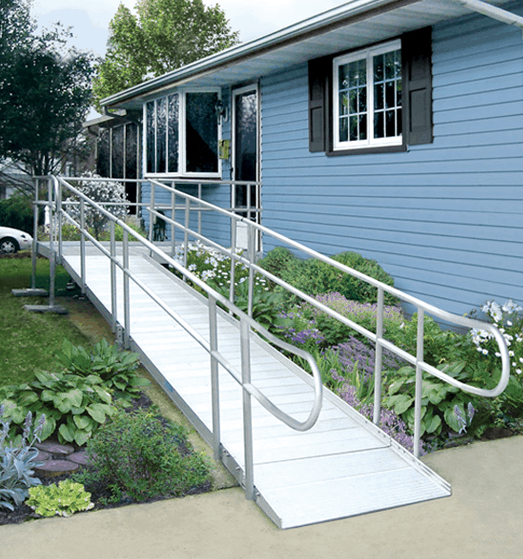Aluminum Wheelchair Ramps for Homes
Need a convenient, modular, and affordable solution to your mobility problems?
We build quality portable, temporary and semi-permanent ramps tailored fit to your needs.
Many houses require steps to get inside. A wheelchair ramp is an excellent choice if you have elderly parents or any other family members with physical difficulties. Fortunately, handicap ramp installation is a fairly inexpensive job, but there are ways to lower the expenses even more. A durable aluminum wheelchair ramp system can be installed in sections. They are designed as an attractive, easy to assemble, and flexible alternative solution to other ramp systems like concrete, galvanized or wood. The lightweight aluminum access ramp is made from heavy-duty material. It usually comes with a sectional design that is ADA-compliant, when there’s a need to install a semi-permanent ramp. OSHA standardized wheelchair ramps made with aluminum provide superior footing, non-slip solid surface, and traction to ensure wheelchair safety.
Aluminum vs. Wood Wheelchair Ramp
Metal ramps, especially lightweight aluminum ramp systems are becoming more popular as an alternative to wood ramps. We’ve listed down the top reasons why go for aluminum handicap ramps:
- Typically, aluminum ramps do not require permits since they are deemed temporary. This is why they are installed in places over existing porches, steps, sidewalks, and yards.
- Aluminum ramps are designed to have integrated feet that rest flat on the ground for easy use. If a surface is softer, concrete patio blocks or bricks are laid under them to distribute the load better.
- In windy locations, aluminum ramps are usually tied down with ground augers to prevent movement.
- Aluminum ramps offer excellent traction and water /snow shedding. Metal ramps are less prone to ice build-up. Some ramps (particularly aluminum) can handle the use of some types of snowmelt better than wood ramps.
- Because aluminum ramps are modular and do not need permits, they are ideal for short-term rental use rather than purchase.
- Aluminum ramps are excellent because they need little maintenance.
- The Aluminum ramp can accommodate up to 1,000 lbs. weight capacity
How much does an aluminum wheelchair ramp cost?
Metal handicap ramps such as aluminum types have a price range of $150 to $200 per linear foot for materials alone. The aluminum access ramps are normally a little less expensive than either concrete or steel. Aluminum types of ramps have some features and benefits such as high strength and corrosion resistance. Keep in mind that aluminum is lightweight, thus it wobbles and bends more easily than heavy metal. So, it’s important to check the ramp on an annual basis to make sure it’s still sturdy, and none of the nuts or bolts are loose.
Prefabricated Aluminum
These modular and lightweight prefab aluminum ramps can save you money by allowing you to assemble them yourself (DIY). But usually, they have an extended lead time (the time it takes to manufacture and ship your order). You can expect to pay around $100 to $800 on average to buy a prefabricated ramp made of aluminum.

How much does a metal wheelchair ramp cost?
Metal access ramps can cost between $200 and $250 per linear foot. Although a steel ramp is less permanent than a concrete ramp, it still offers great stability for use of wheelchairs, scooters, trolleys, and walkers. For outdoor use, galvanized steel is ideal, with its texture for added traction, safe for any type of movement. The only downside is the possibility of corrosion and rust. Unlike wood, steel dries off quickly to avoid rot. Compared to aluminum, galvanized steel is less flexible, heavier, and more secure. Because unprotected steel can rust or corrode, we recommend galvanized steel. A non-skid or textured surface is important to avoid slippage.
How much will it cost to build a Wheelchair Ramp?
Depending on the location, the type of materials, and the difficulty of the project, the average price for a wheelchair ramp is $1,000 to $3,000, including labor costs. You can expect to pay double for labor in larger cities and 10% to 20% more for materials. Additional materials, more challenging building conditions, or a higher t han average stair height will increase the total project pricebetween $4,000 and $6,000. All costs will be included in a professional estimate, however, labor costs for each contractor will vary. For instance, carpenters or handymen will charge about $70 per hour for a wooden type of ramp. Concrete ramps will cost you from $60 to $90 per hour if you hire a mason or handyman. Regardless of the choice you make, you need a contractor who is experienced, knowledgeable about ADA regulations, and skilled at building these ramps.
Does Medicare pay for wheelchair ramps?
A handicap ramp is considered durable medical equipment (DME) under Medicare policy and is fully reimbursed if used for medical purposes. The ramp systems need to be approved by a licensed physician as medically essential, so this is not something that happens very often. Typically, the costs of wheelchair ramps are excluded from Medicare coverage. The policies do not cover modifications to residential properties and equipment upgrades. Again, due to Medicare’s Durable Medical Equipment coverage policy, ramps for wheelchairs are covered only when a doctor certifies them as medically necessary. But recently, newer plans like Medicare Advantage have helped make ramp construction more accessible for some seniors. Plans often include supplemental health care items to help prevent injuries, reduce emergency room visits, or assist with practical needs.
Who will benefit from Medicare Advantage Program
The people listed below may be qualified to apply for Medicare Advantage programs. People who qualify for the benefits may be able to receive handicap access ramps for their homes and other upgrades. People who suffer from:
- Patients with metastatic cancer
- Sufferers of rheumatoid arthritis
- Seniors with Alzheimer’s disease
- People who suffer from other forms of dementia and memory loss
Medicaid Assistance
The Medicaid federal program offers ramps for retired seniors, the elderly with low income, and handicapped persons. Medicaid policies vary by state, but they include regular Medicaid benefits and long-term nursing home care benefits. Some states follow Medicaid’s guidelines, and will only reimburse wheelchair ramps on the grounds that they are medically necessary by a physician.
There are also waivers available through Home and Community-Based Services (HCBS). Because Medicaid is an entitlement program, it usually only covers wheelchair ramps if they’re needed for medical reasons. Several successful cases have gone through the court system, but this is highly unusual. Good thing, many states provide waivers for handicap ramps and home modifications through the federal HCBS program.
How can I get a free wheelchaiACr ramp?
- We’ve compiled a list of non-profit organizations, charitable programs, and institutions that build ramps for the poor and handicapped. They offer both construction and funding services for wheelchair ramps. Example of such programs is the free home ramps for the elederly. They provide handicapped ramps for free to the disabled, low-income people, and retired seniors. Someone from the program will assess your home and determine if it needs to be modified. The ramp is constructed by volunteers with materials donated by individuals and organizations.
- Medicaid waivers can be used for home modifications for disabled people or for elderly people who are low-income. If you need a home modification waiver, you should contact your state as each state has a set of requirements.
- Veteran Assistance – Veterans who qualify may receive the Cash Assistance benefit from the Dept. of Veterans Affairs. Qualified veterans receive a care budget allowing them to choose the services and supplies they need. If that budget exceeds your budget, it will be paid out of pocket. Veterans may also qualify to apply for Home Improvement and Structural Alteration Grants (HISA Grants) from the VA. The grants are designed to help make accessible home improvements. Veterans who have military service disabilities may qualify for up to $6,800. Disabled veterans may receive up to $2,000 if they weren’t related to their time in service.
